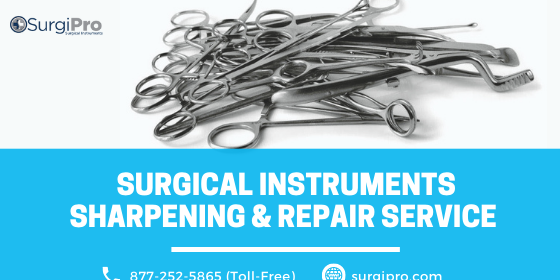
What Are the Smart Options to Ensure Precise Instrument Functionality and Reduce OR Service Costs?
Posted on 17th Dec 2021
Hospitals are dedicated to providing a safe environment for patients as well as the best possible medical and surgical outcomes. Hospitals can improve the performance of surgical equipment and, more critically, boost patient safety and improve surgical results by prioritizing regular, sharpening, and surgical instrument repair services.
Regular repair service of surgical instruments can also help you to save the extra cost you need to buy new instruments. The German stainless steel instruments are known to be the finest grade of instruments made and supplied all over the world. Examinations, regular surgical tool sharpness checking, and keeping a sharpening plan that works best within the facility are the best strategies.
How do properly functioning instruments are safe instruments?
“Sharp tools cut wood, blunt tools cut fingers,” as the adage goes among carpenters. Surgical instruments follow the same rules.
When a surgeon has to use additional force on a sharp instrument, he or she loses control of the gadget. A failing clamp can lead to a loss of control, which can cause the surgery to be delayed or, worse, result in an undesired surgical outcome. A sharp trocar, for example, is safer to enter into the abdomen since the risk of puncturing underlying organs is lessened. Scissors that chew instead of cutting produce additional tissue harm. If clip appliers are misaligned, vessels may only be partially sealed.
How often should you sharpen your surgical instrument to get best results?
Maintaining the sharpness of your surgical equipment is very crucial. Every 6-8 months, cutting instruments should be sharpened.
All hospitals and facilities should establish a practice for assessing the sharpness of their surgical scissors.
If you’re unsure, go for it! Sharpness Test Material is a useful tool to have on hand in the office between bi-annual sharpening. Latex is commonly used in instrument sharpening test material, but latex-free test material is also available. Using the test material every couple of weeks will ensure that your blades are in good operating order and will assist you to avoid using a dull scissor in a significant pack.
What are the most widely sharpened surgical instruments?
The majority of surgical instruments are delicate and require extra attention. Maintenance and repair are particularly more vital in developing countries, where instruments are often hard to replace.
- Surgical Scissors
- Bone Cutters
- Osteotomes
- Rongeurs
- Chisels
- Bone Curettes
- Knives
- Punches
- Dental Instruments
The main tasks done during sharpening and repairing of surgical instruments include:
- Polish up Deburr
- Align/Adjust
- Sharpen/Hone
- Deburr
- Align/Adjust
- Getting Rid of Rust and Pitting Cleaning
- buffing/polishing, and
- lubrication
Final words:
SurgiPro, Inc. sells only the highest quality German stainless steel instruments that have been meticulously prepared. This means they can stand by their word when they say our surgical tools come with a lifetime guarantee and offer free shipping on orders over $100. SurgiPro offers surgical instrument sharpening and repair service in addition to selling the highest quality German stainless steel tools. Please contact us at 877-252-5865 (Toll-Free) for additional details.
